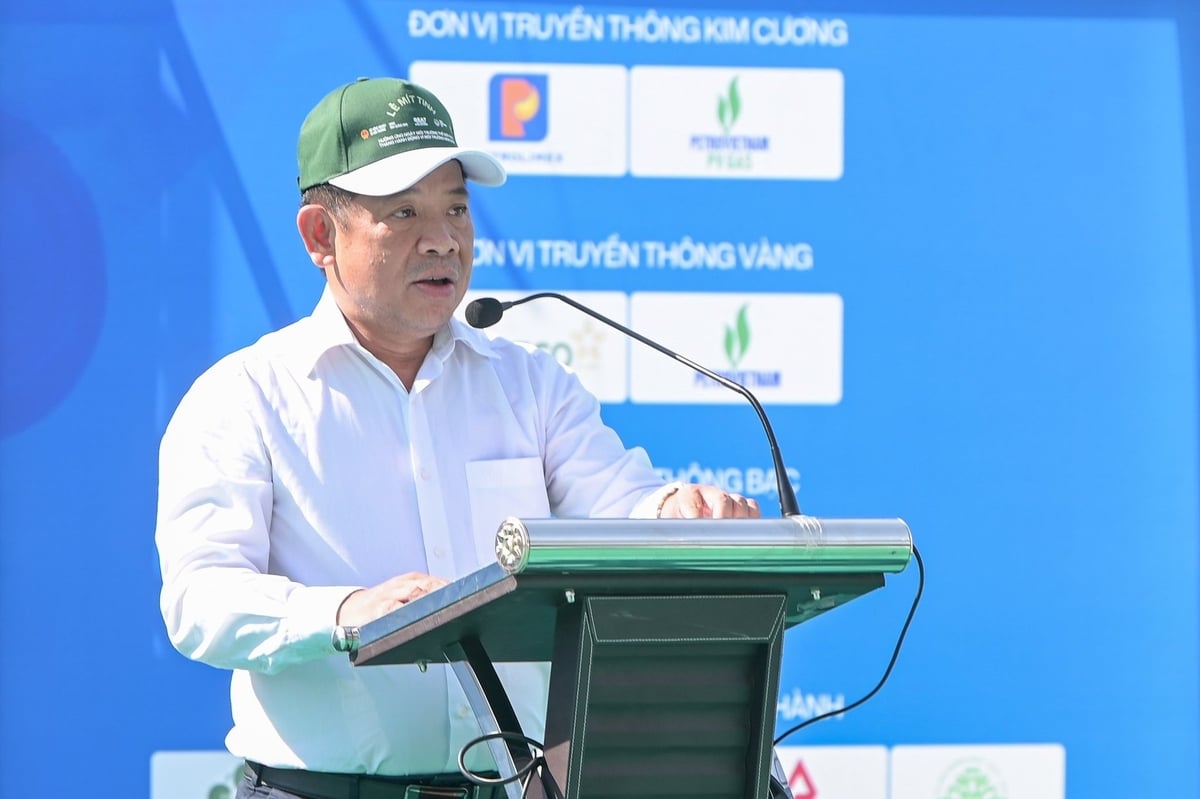December 7, 2025 | 20:20 GMT +7
December 7, 2025 | 20:20 GMT +7
Hotline: 0913.378.918
December 7, 2025 | 20:20 GMT +7
Hotline: 0913.378.918
On the morning of June 1, at the ceremonial meeting in response to World Environment Day and the launch of National Action Month for the Environment 2025, Mr. Van Ngoc Thinh, CEO of WWF-Vietnam, did not begin his speech with a call to action, but with a stark number: more than 11 million tons of plastic are dumped into the ocean each year.

Mr. Van Ngoc Thinh speaks at the ceremony in response to World Environment Day 2025. Photo: Tung Dinh.
On the land of Ha Long - a locality directly confronting the consequences of marine pollution, Mr. Van Ngoc Thinh, Country Director of WWF-Vietnam, opened his remarks with a observation. He asserted, plastic waste is no longer a distant warning or an abstract future concern. It has become a harsh, daily reality, quietly but relentlessly degrading entire marine ecosystems. In his words, plastic waste is not merely discarded material. It is the point of origin for a cascading chain of impacts, from the loss of biodiversity and collapse of marine food chains, to the erosion of coastal livelihoods and skyrocketing costs of environmental remediation.
With over 3,200 kilometers of coastline and a significant portion of its economy reliant on the sea, Vietnam cannot stand outside this chain of impact. Once plastic waste begins to infiltrate, the damage to marine ecosystems becomes immeasurable.
However, Mr. Thinh did not call for sweeping macro-level changes. Instead, he called for practical and meaningful changes beginning at the individual level. He encouraged each citizen to take small but impactful steps, such as refusing single-use plastic products and choosing durable, sustainable alternatives. “The story of a plastic bag that is used for a few minutes but remains for hundreds of years is no longer new,” he remarked, “but the solution still eludes us because collective behavior has yet to truly change.”
At the systemic level, Mr. Thinh underscored the issue of waste separation at source - a principle already enshrined in law but unevenly applied in practice. He noted that much of the waste is still mixed, making recycling inefficient and costly. Models for plastic reduction and pollution prevention at the local level, while promising, remain in early or pilot stages. WWF-Vietnam, he shared, is actively piloting integrated waste management projects in key coastal areas such as Con Dao and Phu Quoc. However, a critical condition for success is the early and active involvement of local authorities.
Another focal point of his speech was the role of education and communication. Rather than one-way messaging, he advocated for communication strategies that help communities recognize the direct economic benefits of environmentally friendly behavior.
Instead of relying solely on warnings, he proposed that messages should be tied to tangible incentives. For example, when fishermen realize that plastic pollution drives away tourists or increases waste collection costs, they will naturally adapt their waste disposal practices aboard their vessels.
In the long term, Mr. Thinh expressed strong support for institutional reforms such as the Law of Environmental Protection and new policy frameworks to promote a circular economy. However, he also cautioned that these legal tools will only be effective if they are backed by reliable data, and if they include clear testing environments for new models of recycling, reuse, and waste valorization.
Turning to the role of the private sector, Mr. Thinh acknowledged that current measures such as Extended Producer Responsibility (EPR) are important, but not yet sufficient. Enterprises need additional, concrete policy support to strengthen their motivation and capacity to combat plastic pollution.
In closing, Mr. Thinh left the audience with a powerful message: “Every small action can become a building block in a systemic solution.” Only when individual behavior is effectively linked with national policies, market mechanisms, and local waste management strategies, he argued, can the fight against plastic pollution evolve from passive reaction to proactive transformation.
The ceremonial meeting in response to World Environment Day (June 5) and the launch of Environmental Action Month 2025 was jointly organized by the Ministry of Agriculture and Environment and the People’s Committee of Quang Ninh province. The event was coordinated and implemented by the Vietnam Agriculture and Nature Newspaper.
This year’s meeting embraces the global theme “Beat Plastic Pollution”, initiated by the United Nations Environment Programme (UNEP), which emphasizes the urgent need for collective action against plastic waste — one of the most pressing environmental challenges of our time.
A number of prominent enterprises and organizations accompanied the program as official partners and sponsors, including: Petrolimex, PV GAS, Petrovietnam, TKV, Vinamilk, La Vie, VIMC, EVNGENCO1, URENCO, among others.
Translated by Phuong Linh

(VAN) At the TARASA25 Conference, participating countries shared experiences on implementing agroecology and regenerative agriculture, contributing to a sustainable transformation of food and agriculture systems.

(VAN) Green industry is becoming a driving force for the development of Hue City, not only promoting economic growth but also protecting the environment, creating the foundation for the Net Zero goal.

(VAN) As of 2025, the ASEAN region has a total of 69 ASEAN Heritage Parks recognized across its 10 member states. Among them, Viet Nam contributes 15 ASEAN Heritage Parks.

(VAN) Yok Don National Park has high biodiversity with numerous endemic plant and animal species, and it is also the only dipterocarp forest ecosystem conservation area in Viet Nam.

(VAN) Viet Nam and Brunei signed two important MOUs on fisheries and IUU, expanding cooperation in agriculture, the environment, and Halal exports, aiming to substantively implement joint projects.

(VAN) The Viet Nam Coconut Association worked with the International Finance Corporation (IFC) and businesses to promote the supply chain, enhance competitiveness, and develop the coconut industry sustainably.
![Hue aims for Net Zero: [2] Pioneering low-emission tourism](https://t.ex-cdn.com/nongnghiepmoitruong.vn/608w/files/huytd/2025/12/04/0633-dulichzero-4-095634_236-161125.jpg)
(VAN) The ancient capital of Hue has developed Net Zero tourism products and models, aiming to reduce carbon emissions and pioneer the establishment of Viet Nam's green tourism destination.